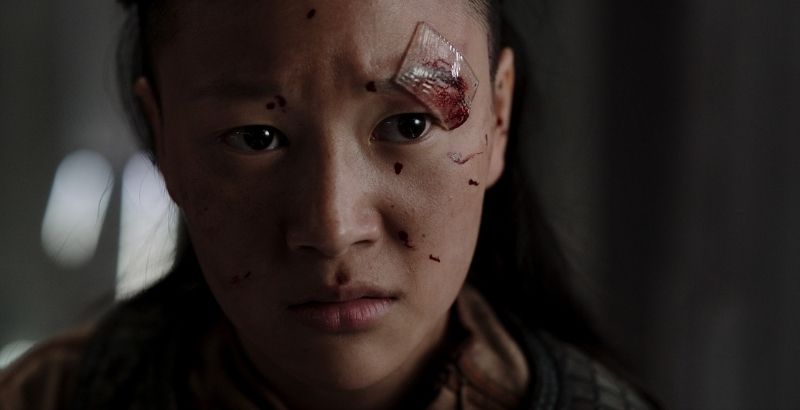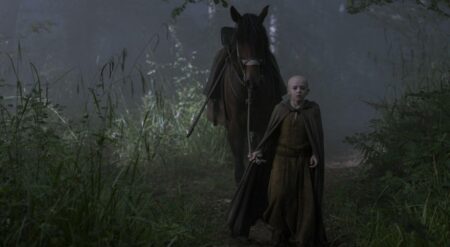Halo is iconic. It’s a franchise that revolutionized multiplayer gaming and has built lore that spans novels, multiple games, and yes, some movies too. Now Paramount is tapping into this pop culture vein to bring Master Chief to life in live-action. The series comes from showrunners Steven Kane and Kyle Killen and stars Pablo Schreiber, Natascha McElhone, Yerin Ha, Bokeem Woodbine, Jen Taylor, Shabana Azmi, Bentley Kalu, and Olive Gray. Halo (2022) Episodes 1 and 2 premiered at SXSW 2022 ahead of the series’ release later this week. But how does it stack up?
From the start, Halo (2022) feels like, well, Halo. The score and the visuals hit the notes they need to and when the Spartans show up, audiences are given an episode opening with a punch that also wholeheartedly embraces video game mechanics – shoutout to Master Chief taking shots, covering, and then regaining that shield health back.
Right from the start, Halo is recognizable to those who have played the games, but more importantly, with the young co-lead Kwan Ha, it flips open the page to a new chapter of the Halo story as well. In Halo Episode 1, “Contact” the story of the series starts in 2552.
Here, humans on the planet Madrigal have been fighting for independence from Earth, but a fatal encounter with the Alien Covenant complicates things. Master Chief, John 117, and his super-soldier “Spartans” join the fight, both physically in the colony and mythically through the stories about them pushed by the propaganda that highlights their “saving.”
But as the arms of the UNSC, the Spartans have a complicated relationship with Madrigal and Kwan Ha, a survivor of the colony is at the center of that. After the battle, Master Chief heads to his home planet of Reach with Kwan and a mysterious object he discovered on the planet. But a controversial order has John questioning his mission, and himself.
While I could dive into Episode 2 for this, since they were both screened, I want to focus on Halo’s debut episode instead. In “Contact,” the world we’re about to enter is laid out in full. The audience is shown what will be the same and what will change, but more importantly, the complexities that lie at the heart of the series.

First, we get to see the reality of the UNSC’s colonization and ultimately the impact of the Halo Wars. The way it’s left some people on the outs in order to fight for a “better” future against the Alien Covenant and how morality is recoded to prioritize the UNSC’s mission first and foremost. Second, we get to see the complexities in the characters we’re introduced to, primarily Kwan Ha and Master Chief.
For Kwan, she is aggressive, angry, and doesn’t hesitate to do what she thinks is right, even if it costs her her life. But at the same time, she’s a kid. She’s a vulnerable teen girl with a lot on her shoulders, crushing her, while she tries to survive. In this role, Yerin Ha brings her all. She throws herself into the role both when it comes to being vulnerable, and hiding it behind a grit that is relatable. But she also throws herself into the physical part of the role as well.
Then, there is Master Chief. The icon, the legend, the character that to be honest has defined a whole generation of gaming, not just one franchise. With big shoes to step into, Pablo Scheiber joins the call to join the fight and he does so with a moving performance. There are many Master Chiefs in a way, we all map ourselves onto the character which means that Schreiber had his work cut out for him.
However, his Master Chief nails a new version of chief that doesn’t abandon what came before but rather adds more depth to an almost blindspot in Halo lore. Here, we get to see a Master Chief who grows from cold and programmatic to someone who is trying to find out why he cares beyond what he is asked to do. This allows Schreiber to bring a character that oscillates between intimidating (truly, casting a 6’5″ actor was perfection) and vulnerable.

All of this said though, there are differences from the games that I’m sure I could nitpick, but this is a new series, a new story, and one that honors the core of Halo, which is so much more than Master Chief keeping his helmet on.
The only critiques I have for Halo are that the pacing seems to lag in parts and the special effects aren’t always the standard you would expect from a Paramount production. That said, while there are some moments of effects that are lacking, there are others where they shine, particularly in the show’s opening animated credits, and any scene that visualizes space or offers up close-up interactions with alien life. Additionally, Halo‘scostuming more than makes up for some of its effects misses.
I’m not going to lie, video game adaptations have a hard road ahead of them with a lot of potholes left by the ones that came before. They have to manage the expectation of the gamer tuning in, working in existing lore, visuals, and even mechanics while still managing to remain accessible to newer audiences. This also means that video game live-action exists in a space of hit or miss that leaves them fairly divisive. Unfortunately, I think this is where Halo will fall. Embraced by some and disliked by others, but not due to its own faults, but rather the nature that comes with these adaptations.
Halo (2022) works for me, and I hope it works for you, or at very least you open yourself to allowing a new story to be told for a franchise we all hold dear.
Halo (2022) premiered at the SXSW International Film Festival 2022 and is streaming exclusively on Paramount Plus.
Halo (2022) Episodes 1-2
-
Rating - 7/107/10
TL;DR
Halo (2022) works for me, and I hope it works for you, or at very least you open yourself to allowing a new story to be told for a franchise we all hold dear.






